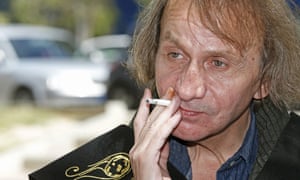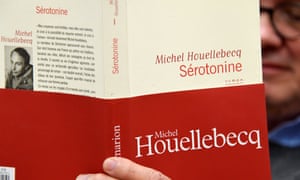He is idolised as France’s biggest literary export, a controversial poet-provocateur who holds up a mirror to the grim truths of contemporary France.
So when Michel Houellebecq’s long-awaited novel, Serotonin, hit French bookstores on Friday morning with a massive print run of 320,000 copies, translations in several countries, and the author for the first time staying silent and refusing any interviews or media promotion, it was proclaimed a national event.
The novel’s release was accompanied by the Légion d’honneur, France’s highest national honour, being bestowed on the 62-year-old enfant terrible for his services to French literature by the president, Emmanuel Macron.
Serotonin, the story of a lovesick agricultural engineer who writes trade reports for the French agriculture ministry and loathes the EU, has been hailed by the French media as scathing and visionary. The novel rails against politicians who “do not fight for the interests of their people but are ready to die to defend free trade”.
Written before the current gilets jaunes anti-government movement began blockading roundabouts and tollbooths across France, it features desperate farmers in Normandy who stage an armed blockade of roads amid police clashes.
Houellebecq and his despairing, white, middle-aged, male narrators are seen as eerie predictors of the national mood. His last novel, Submission, which envisioned a France subjected to sharia law after electing a Muslim president in 2022, was published on 7 January 2015 and featured on the cover of the satirical magazine Charlie Hebdo just before terrorists stormed the offices of the publication and shot dead 12 people.
Platform, his earlier controversial novel about sex tourism and terrorism, came out a year before the Bali bombings of 2002.
Serotonin “confirms [Houellebecq’s] status as a visionary and he earns his stripes as a great novelist of the people”, wrote the rightwing paper Le Figaro.
The novel follows a typical Houellebecqian anti-hero: lonely, dissatisfied and ranking the sexual talents and bodies of the women he once slept with, as he returns to the Normandy countryside, remembering lost love. The narrator, an agriculture consultant, once worked for the agrochemical conglomerate Monsanto before an unsuccessful stint devising new ways of promoting Normandy cheese. He finds few joys in modern urban life, bar the array of hummus varieties in city-centre supermarkets.
In a recent article for Harpers, Houellebecq lauded Donald Trump for his protectionist policies, calling him “one of the best American presidents I’ve ever seen”, and praised Brexit: “The British get on my nerves, but their courage cannot be denied.” Serotonin, which will be published in English in September, viciously criticises free trade. Houellebecq has said he does not vote in elections, only in referendums.
As often is the case with Houellebecq, throwaway lines caused offence even before publication, with an MP for Macron’s La République En Marche party complaining that his narrator had called the western town of Niort the “ugliest place in France” and suggesting the novelist should “get out of his Parisian bubble” and explore the town.
Indeed, being trapped in a Parisian bubble as a superstar writer is something Houellebecq has lamented. If he once embodied the anonymous, nihilistic man on the drab concrete outskirts, on France’s periphery, he has become such a wealthy figure that he complained at the last presidential election: “I’m part of the globalised elite now.”
Houellebecq’s worldwide fame came from his deliberately nihilistic novels depicting men trapped in loveless existences, admiring of casual sex. This seventh novel, in which a narrator looks back in detail at past girlfriends in terms of how they dealt with his penis, caused even some of his greatest admirers, such as the critic Nelly Kaprièlian from the magazine Les Inrocks, to concede: “He’s missed the Me Too movement – that’s obvious.”
Kaprièlian told French radio that his “dated” view of women was her only reservation about the new novel. A reference to bestiality and a description of a discovery of child abuse imagery on a suspect’s computer in the novel also irked some critics. Elisabeth Philippe wrote in L’Obs: “That whole aesthetic of the ‘old white male’ is dated, past its sell-by date and clearly no longer brings anything good. ‘What’s the point in trying to save a vanquished old white male?’ the narrator asks. What’s the point, indeed.”
Although Houellebecq has shut himself away from the media – he recently left it to his friend Carla Bruni, the singer and supermodel married to the former president Nicolas Sarkozy, to reveal on Instagram his latest marriage – he has not given up on cinema. Houellebecq has often appeared behind and in front of the camera, and has reportedly been filming with the actor Gérard Depardieu, with the two men playing characters at a seaside spa.
Meanwhile, Charlie Hebdo magazine, which in 2015 had featured Houellebecq on its cover as a haggard Nostradamus preparing to celebrate Ramadan, published a brief paragraph saying a new Houellebecq novel was about to be released. “We won’t be saying anything bad about it: the last time we did wasn’t a success for us.


No hay comentarios:
Publicar un comentario